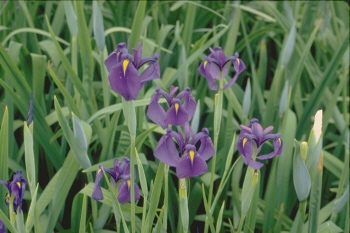 |
| Ton Ton Bana |
"Ton Ton Bana" is a Japanese iris
cultivar that was registered with The American iris Society in 1993. This plant
is a unique clone of Iris ensata which, as indicated in AIS records and the SJI
Cumulative Check List, was collected in Mie Prefecture. This is the prefecture
where the famous Ise district is located. The name "Ton Ton Bana"?@has
for the Japanese a special ecological significance with regard to Iris ensata
in the wild.
Iris
ensata in the wild is usually found in high meadows or moors in Japanese
mountains. The Nyugasa Moor in the central area of Honshu is a typical habitat
for this iris species . There is a small stream running through this moor and
Iris ensata is often found growing along this stream. When you stand beside the stream looking at
the flowers, you can hear the sound of the gushing water. The term "ton ton" in Japanese is
onomatopoeic. "Ton ton" imitates the sound of gushing water. The
people who lived in the area in ancient times coined the term "ton
ton" to means "gushing water." They also coined the word
"dondo", another onomatopoeic word which also means "gushing
water." The word "bana"
means flower. Therefore, "Ton Ton Bana" means "The flowers
growing beside a gushing stream." People who live in Mie prefecture
sometimes call this iris "Ton Ton Bana" and at other times
"Dondo Bana." The meaning is the same.
Since ancient times the Japanese people have
been very sensitive to natural phenomena. A Japanese philosopher once wrote
that Western civilization has the "rational forest," but the Japanese
have the "sensate forest."
European forests are often quite open, bright and easy to walk through
if one just uses his mind. This is because the trees in the forest have been
intentionally planted and the undergrowth cleared. Japanese forests, on the
other hand, are very dark and difficult to walk through because they are truly
wild with thick bushes and other undergrowth. Japanese people must use all five
senses to protect their bodies from prickles and fallen trees when moving
through their forests. I think it is this Japanese sensitivity to nature, which
produces the name "Ton Ton Bana."
|